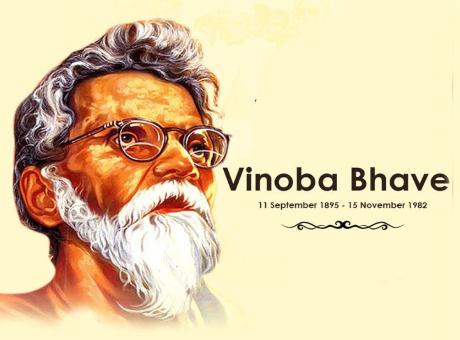For smooth Ad free experience
For smooth Ad free experience
As a non-violent freedom fighter and ardent human rights advocate, he was one of the Gandhi's most devoted disciples who led many movements for his people and many battles against the oppressor. But it was his innovative thinking and spiritual well being that made people follow his path and honoured him as their Acharya.

Passed away on 15th November 1982
“Perhaps none of Gandhi’s followers have created so many worshippers of Truth & Non-violence, so many genuine workers as has Vinoba Bhave.”
There was a village called Pochampally a few years ago where about 700 families lived in poverty-like conditions mostly due to low caste status or landlessness. Only a few miles away from Hyderabad city, the village was a centre for recurring communist and violent activities between local peasants and landlords, mainly caused by the insecurity among landless families of the prevailing Telangana peasant movement. However, the situation in Pochampally became so tense that the issue needed to be resolved by someone else.
It was then that Vinoba Bhave, the well known Gandhian and human rights advocate, was enlisted to help resolve these issues. At that time, Vinoba was staying in his Pavnar Ashram in Nagpur, where he was persuaded to come to the meeting in Shivarampali. In accordance with Gandhian custom, Vinoba was prepared to embark upon his journey on foot by travelling towards the south
While Vinoba was aware of the intense socio-political situation in Telangana, he was also aware that preventing violence was extremely important. After the last day of the meeting, Vinoba and his accompanists announced that they will tour the Communist areas of Telangana spreading the message of non-violence. Their first stop was Pochampally. Villagers welcomed their arrival warmly and arranged their stay for a few days.
Since he believed only a peaceful dialect would bring us to a solution, he wanted to interact directly with the villagers. Vinobha visited a small community of Harijans, who were treated as untouchables. His interactions with them revealed the poor conditions in which they lived. Further, the village was divided by class groups and was largely oppressed by policemen, clerk people, and Communists. With high hopes on Vinoba, the villagers began to address their issues, as the crowd gathered around him and unanimously demanded “eighty acres of land, forty wet-forty dry for forty families”
In an attempt to solve this problem, Vinoba asked the villagers, “Is there not something we can do ourselves if we can't get land from the government?”
Unexpectedly, a voice echoed inside the throng, promising 100 acres of land to these people who have been struggling for years. It was Ram Chandra Reddy's high-pitched, unplanned voice that started this whole episode. He was a local landowner who owned 3500 acres of land in the village. While people applauded him for his kind gesture, Vinoba brewed up a solution to this land issue. Since he believed in a society without stateheads, he was enchanted to see how Indians could solve their problems by themselves without external influence.
Then Vinoba announced the beginning of the greatest and perhaps most unique movement in modern Indian history. In this Bhoodan Movement, also known as Bloodless Revolution, the goal was to obtain voluntary contributions of land from wealthy owners and landlords. Yes, it may sound a lot cynical nowadays since it is too rare to find people willing to donate their land to someone they don't even know. But it was made possible by Vinoba Bhave, who over the next 20 years managed 4 million acres of land, which were then distributed to many landless families. Wondering how he did it?
His idea was simple, his act was noble, and his words led the movement. Having begun in Pachomally, Vinoba travelled across all of India for the next few decades to ask wealthy landowners and landlords to share a small part of their land with their poor and oppressed fellows. Despite this, convincing could still be an issue. But Vinoba saw this piece of land more as a soil of earth that belongs to everyone and conveyed the same to his fellow donor. In this way, more people were willing to share their land as a part of the charity and help others prosper and live in dignity.
In a book titled From Bhoodan to Gramdan, Vinoba Bhave wrote, “I stretched out my hand to demand land, as a son would do to the father. The villagers never knew my mind, and were present with garlands to offer to me. I pointed out to them that though the flowers in their hands were beautiful, Earth, the mothership of these flowers, was indeed more beautiful. While flowers were meant for the Lord’s worship, I ask for land only. I am your son, a member of your family. If you have four, give unto me my fifth share.”
Although you are still trying to grasp the generosity and integrity of such a person, this whole movement was actually just a part of his lifelong contribution to the prosperity and independence of India. Essentially, he was just a man serving the nation. Despite many loopholes being identified later in time one simply cannot deny the fact that it was one of the most harmless policies in India history that were even successful in alleviating the issue at hand, compared to the unequal land issues that still persist today after endless laws. With every mile, he travelled and every piece of land he donated, he wrote revolution. It is only appropriate to call him India's "walking saint".
0
You might be interested in reading more from
